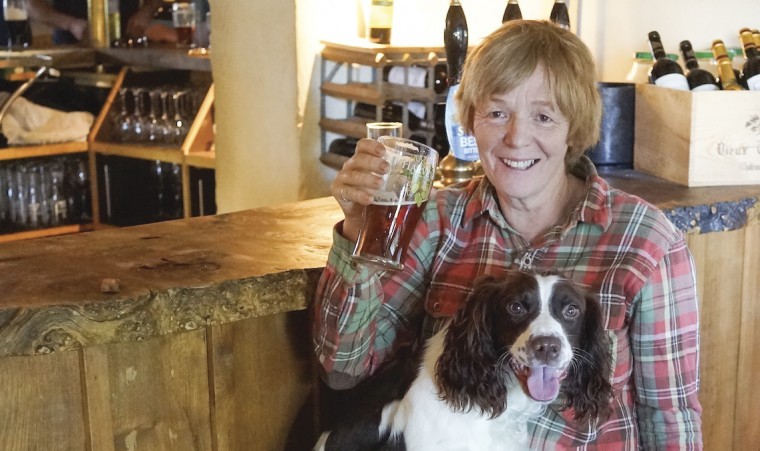Why is it that the ‘phone invariably rings as you’re heading out the door? Returning to answer it, the voice on the withheld number asked “Can I speak to the manager?” Bracing myself to listen to sales talk, while thinking about the chores, I answered: “Only workers live here.” Click… how rude! Apparently workers are not worth talking to: what a delightful discovery.
On occasions I’ve encountered similar attitudes from agricultural salesmen who clearly think that “women” are unlikely to comprehend anything to do with farming business. I assume they imagine that woman’s role is chained to the kitchen sink. Looking at the state of our kitchen right now, it is probably exactly where I should be. It can wait, because out of the window I’ve spotted a ewe needing shepherding help.
Well that young ewe got herself in a right old pickle. A traffic jam in the birth canal, it’s simply not possible to give birth to two lambs side by side. One lamb had to be pushed back to give enough space for one at a time delivery into this world. I advised the ewe to be more careful in future and left her happily licking her lambs.
Thank goodness red number 18 has finally lambed. I’m sure her hormones are the problem. She’s been ambitiously rushing around trying to pinch everyone’s lambs. I’m not sure of the official term for these characters, but they cause havoc and we call them “aunties.” This is not an indictment of aunties, but they’re nothing but trouble. Number 18’s enthusiasm was impressive: she tried to steal off the peg lambs and gobbled up the other ewe’s afterbirth. Now that’s what I call “keen.”
The later lambing and fine weather have enabled us to leave the flock out in the field. We numbered the ewes before lambing, with lambs born numbered correspondingly. Our high proportion of tegs and ewe lambs run much faster than me, so this works well. Many are cunning enough not to be entrapped by their greediness or maternal traits. One crazy mule teg has tested my patience, resisting every trick in the trade to get her into our little trailer. I wanted to shift her to fresh pasture. I now completely comprehend the saying “stubborn as a mule” although I suspect that the original phrase was not referring to sheep.
By the nature of our work farmers learn to deal with both life and death. Lambing experience brings both sad and happy times. Usually the workload is such that there is no time to dwell on it. I’d like to thank the East Sussex and Romney Marsh hunt for their efficient collection of our casualties. The removal of fallen stock is a necessity these days, although personally I can’t see what was so wrong with the system of burial which has existed since time begun.
A definite bonus of this season is witnessing the wonderful light at dawn and dusk – such magnificent displays. I feel privileged to enjoy this scenery. The cuckoo was early and the swallows have arrived. We’ve small birds in abundance and their song is a delight. The ash was out before the oak, but there’s not much sign of a soak yet, although we could do with it.
At the height of lambing, exhausted, dishevelled, with a strong scent of eau de sheep about me, I overheard Nigel tell Radio Four we’d be delighted to host a discussion on lamb. This necessitated abandoning the lambing problems to enable some long overdue housework and baking to be done. The Westminster chiming clock was temporarily removed from the kitchen and our dogs banished. The theme of the Food Programme was to discuss how to inspire young people to eat more lamb. Adding to the mix, Nigel also invited along two female butchers from west London based H.G. Walter Ltd and the head buyer from Farmdrop, an ethical online grocery platform.
The programme was presented by Sheila Dillon. Research has shown that millennials are not eating lamb. Questions stimulated thought provoking conversation regarding how to boost the demand for lamb. The butchers said presentation was key to making it more appealing, and suggested renaming breast as lamb ribs. They advocated hanging it for longer and promoting lamb cuts that are quicker and more convenient to cook, along with providing some recipe ideas.
Other thoughts included a need for smarter marketing and building a better story around different breeds – for example by creating a sheep breed status equivalent to that of the Angus. Then there was the importance of educating the consumer about the improved flavour of the slower grown, pasture fed lamb or hogget. It was enlightening to hear about our industry from the perspective of others connected with our produce in the food chain. It’s good to be challenged, and taken out of our comfort zone as this encourages thinking outside the box.
Nigel made tea, while I distributed my homemade Victoria sandwich. To my horror, on my first munch I discovered a foreign object in my mouth. Goodness whatever could have inadvertently got into my cooking I wondered? I anxiously scanned the faces of our visitors happily eating their cake. I felt relieved and dismayed as I surreptitiously removed two chunks of tooth from my mouth.
I won’t tell my children in case they decide to cull me, which is what I do with my broken mouthed ewes. Disappointingly, there was no shiny sixpence under my pillow the next morning from the tooth fairy. I’m reluctant to make an appointment with the dentist. It usually costs a fortune which adds insult to injury. I’m not brave when it comes to going to the dentist. I think it can wait: farming comes first!




